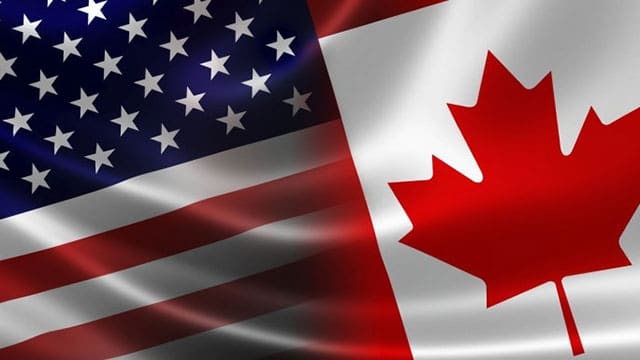Unfortunately, Trudeau’s policies have left Canada vulnerable to Trump’s tariff war

For interview requests, click here
It is cold and gloomy, and the country is on edge. Tariffs are coming—period.
Yet there is a positive side to the ongoing debate about Trump’s threat to impose tariffs on Canadian exports. Could it be a blessing in disguise? Yes, if the right steps are taken at this critical juncture.
For now, let’s be fair. Canada is too dependent on the U.S. It is the largest and, in some cases, the only market for Canadian products. This reliance gives the U.S. a significant advantage. The businessperson in President Donald Trump knows this well. He is using it as leverage to twist arms and humiliate.
The U.S. and Canadian economies have been intertwined for decades. If Trump goes ahead with his tariff threat, it would end more than three decades of free trade between the two countries. Neither country can truly afford that. Tariffs would be disastrous for the Canadian economy. Millions could lose jobs. While the U.S. would also feel the impact, it would not be as severe as Canada’s.
Canada depends on the U.S. to sell products such as oil, gas, and electricity. This reliance has led Canada to sell some products at a significant discount. For example, Western Canadian Select (WCS) oil is sold to the U.S. at a discount compared to the U.S. crude benchmark, West Texas Intermediate (WTI).
 |
| Recommended |
| Donald Trump and the political legacy he hopes to leave behind
|
| Premiers clash over strategy as Trump tariffs threaten economy
|
| Trump’s tariff threats are more bark than bite
|
With tariffs looming, Canadian heavy crude prices for March weakened further. According to media reports, the discount to the U.S. benchmark widened to about US$14.50 a barrel from about US$13.60 on Friday.
However, Canada’s vulnerability is not just a result of Trump’s actions. Past domestic decisions have also played a role in narrowing our options. Actions by the Trudeau government, such as rejecting Germany’s request for Canadian natural gas exports during its energy crisis—and the broader reluctance to expand export infrastructure—have left Canada even more exposed to Trump’s tariffs. Instead of positioning itself as a reliable energy supplier to the world, Canada has remained overly dependent on the U.S., leaving its economy vulnerable to protectionist policies.
As Canada prepares to counter Trump’s threats, the focus has turned to retaliatory tariffs. Federal and provincial governments are working to present a united front. However, diverging priorities among provinces make achieving unity a difficult task. Alberta, for instance, has strongly indicated it will not accept any export tariffs, especially on oil and gas going to the U.S.
“Alberta is the most exposed province to tariff disruptions by a wide margin,” University of Calgary economics professor Trevor Tombe told reporters. As Canada’s largest oil-producing province, Alberta accounted for 84 per cent of the country’s crude output in 2023.
“The bedrock of that tariff-free relationship between Canada and the U.S. is energy,” Alberta Premier Danielle Smith said last week. She emphasized that Canada exports heavily discounted oil to the U.S., which is then upgraded and sold as a value-added product for a price up to three times higher than the raw crude.
This is a win-win situation for both sides, she said.
While Alberta emphasizes the critical role of energy in maintaining trade stability, others, like former prime minister Stephen Harper, have pointed out deeper flaws in Canada’s trade relationship with the U.S. Harper rebutted Trump’s claim that Canada’s trade surplus with the U.S. represents a subsidy by the U.S. to Canada. He argued the surplus exists because of large quantities of Canadian oil purchased by the U.S. at a significant discount, driven by Canada’s lack of alternative export options. “It’s actually Canada that subsidizes the United States in this regard,” Harper said.
While Trump appears intent on imposing tariffs on Canadian imports, Ottawa is exploring other export opportunities. Canada is enhancing trade ties with partners like Japan, the European Union, and other global markets. This represents a silver lining—an opportunity for Canada to diversify its customer base and reduce reliance on the U.S.
This diversification will require political adjustments and significant infrastructure investments. For example, Canada must focus on constructing new export infrastructure, including liquefied natural gas (LNG) terminals, to supply energy to high-demand markets in Europe and Asia. At the same time, trade agreements with key partners must be strengthened to open access to a broader range of products and services.
The Trump threat could then be a God-given opportunity for a resource-rich Canada. Ottawa seems to recognize this.
“I have always had the mandate as Canada’s trade minister to diversify,” Mary Ng, Canada’s minister of international trade, told CNBC on Jan. 16. “It’s really great for us to be doing work with America, but, absolutely, we also need to be pursuing opportunities around the world. And we are.”
This will require political adjustments and proper infrastructure. But if Canada succeeds, it will no longer need to offer discounts on its oil and gas exports, which would greatly benefit the Canadian economy, especially Alberta.
The process will be long and arduous, but the rewards will be worth it.
“Canada must also wake up to the reality that we need to diversify our global customer base, not just for energy but for all Canadian products, to build a more prosperous and resilient economy,” Canadian Association of Petroleum Producers CEO Lisa Baiton said.
She could not be more correct.
Toronto-based Rashid Husain Syed is a highly regarded analyst specializing in energy and politics, particularly in the Middle East. In addition to his contributions to local and international newspapers, Rashid frequently lends his expertise as a speaker at global conferences. Organizations such as the Department of Energy in Washington and the International Energy Agency in Paris have sought his insights on global energy matters.
Explore more on Trump administration, Trudeau government, Trade, Canadian economy, Federal debt and deficit
Troy Media is committed to empowering Canadian community news outlets by providing independent, insightful analysis and commentary. Our mission is to support local media in building an informed and engaged public by delivering reliable content that strengthens community connections, enriches national conversations, and helps Canadians learn from and understand each other better.
